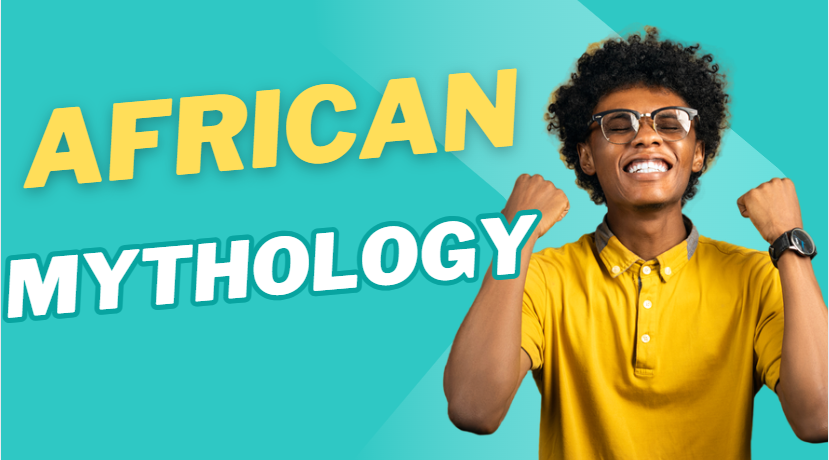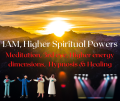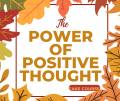
This academic paper examines the African concept of creation, arguing that the belief in a creator God is central to various African belief systems. It analyzes several African creation myths from different cultures, exploring themes like creation by delegation, creation ex nihilo, and the ongoing divine sustenance of creation. The authors employ a phenomenological approach, drawing on diverse sources including myths, proverbs, songs, and names given to God and children. The paper contrasts the African worldview with Western philosophical perspectives on creation. Finally, it highlights the consistent theme of order and hierarchy within the African creation narratives.
- What is the general African understanding of how the world was created? The prevailing belief across African cultures is that the world was created by God. This act of creation is seen as intrinsic to God’s nature, not something separate from or beyond His capabilities. He is frequently referenced in prayers, songs, and proverbs as the “maker” or “creator” of the universe, and different ethnic groups have their unique titles for God that emphasize this creative role (e.g., the “Excavator”, the “Potter of Life”, the “Great Carpenter”).
- How does the African concept of creation differ from some Western perspectives? While some Western philosophies question or deny the world’s creation by God, African ontology firmly asserts God as the origin of the universe. This belief is integral to African spirituality, and creation is not seen as an accident but a deliberate act of a supreme being. While some western philosophical thought has explored concepts like pantheism or alternative origins, this idea is very different from the creation beliefs in traditional African religions.
- Is the African understanding of creation a chaotic event, or is there an order to it? African creation stories generally depict a specific order. God often begins with the spiritual world before the material one, then shapes the physical world in a structured sequence. The creation of humans often comes later, implying man is at the center of the African universe, with the other aspects of creation made to serve and benefit him. Creation follows a hierarchical structure, with God at the top, followed by deities, spirits, humans, and other physical realities.
- What does “creation ex nihilo” mean in the context of African thought, and how is it understood? The concept of “creation ex nihilo” (out of nothing) is widely present in African cosmologies. It means that before creation, there was nothing but God. God, with his infinite power, is the first cause of all existence. This notion doesn’t imply that ‘nothing’ was the source, but that no pre-existing material was used and it was purely God’s act. It emphasizes that creation is not a transformation but an instantaneous act dependent entirely on the Creator.
- What is the role of deities or emissaries in African creation myths? While the ultimate power of creation belongs to the Supreme Being, African traditions also recognize deities or emissaries who are delegated the task of creation. For instance, the Yoruba myth has Olodumare delegating the creation of Earth to the orisha Obatalá. These deities operate within the limits set by God, serving as extensions of His creative power, and their involvement does not diminish the position of the Supreme God as the creator.
- Do African traditions consider creation to be an ongoing process? Yes, Africans do not believe that creation ended once the initial acts were done. Rather, there is a strong belief in divine providence, the ongoing presence and action of God in the world and the things He created. Prayers and proverbs reflect the idea that God continues to sustain and influence the universe and daily life, thus affirming creation as an ever-present process instead of an event.
- How do the names that Africans give to God and to their children reflect their understanding of creation? The many names given to God by various African cultures (e.g., the “Creator,” “First Force,” “Owner of the Spirit”) explicitly acknowledge His role as the creator. Similarly, names given to children often reflect the belief that life is a gift from God, not made by humans, and such names often begin with prefixes referring to God. This reinforces the deeply rooted belief in God’s role as the origin of everything.
- In African ontology, what is the perceived relationship between the spiritual world and the physical world in creation? The spiritual world is seen as preceding the creation of the physical realm. Spiritual beings have more force than those of the physical world. This distinction underscores the perceived hierarchy of beings in the African worldview, with the spiritual beings existing closer to God and more powerful than the physical beings, which underscores how that the spiritual world is prioritized and a strong focus is put on the fact that the spiritual world preceded the physical world. This distinction and relationship is important in defining their relationship with the creator.
- How do African cultures generally view the concept of creation?
- What is the significance of the names Africans give to God?
- Describe the Yoruba myth of creation.
- What is the Efe creation myth and what crucial rule did God establish for the first humans?
- According to the Nyamwezi myth, what event brought death to humankind?
- How do the Wassa people explain the creation of the world and the spirits?
- Briefly outline the stages of creation according to the Basare myth.
- What does the study suggest about the orderliness of creation in African thought?
- What is the concept of creation ex nihilo and why is it significant in the African context?
- How do the examples of African prayers presented demonstrate the concept of divine providence in the context of creation?
Quiz Answer Key
- African cultures generally believe that the world was created by God, viewing creation as a natural attribute of the divine. God is referred to as the maker or creator in various prayers, songs, and proverbs, which is also evident in the diverse titles given to God across different African groups.
- The names Africans give to God are significant because they affirm the belief that God is the creator. They reflect God’s power, attributes, and role as the first cause, as well as the source of all existence. The names also showcase that creation is intrinsic to the nature of God.
- In the Yoruba myth, Olodumare sent the Orisha Obatalá to create Earth. Obatalá descended from heaven with a bag of earth, a gold chain, and a five-toed hen, scattering the earth on water and reporting back to Olodumare, who then named it Ile Ife.
- The Efe myth states that God created the first human, Baatsi, from clay, then covered him with skin and blood. God instructed Baatsi to have many children, but they were forbidden to eat from the Tahu tree.
- The Nyamwezi myth states that Shida Matunda’s wife, out of jealousy, killed a plant that had grown from Shida’s other wife’s grave. This resulted in the death of all humans, animals and plants.
- The Wassa people believe Onyankopon created the world as a companion and created spirits to inhabit it and act as messengers, using a chain to visit the world.
- The Basare myth details God’s creation in stages: first heaven with pillars, then earth from lightning, from which the sun and moon were made, then clouds and a red cockerel, followed by rain and a rainbow, and finally human assistants before other natural features.
- The study suggests that creation in African thought was an ordered event, typically beginning with the spiritual world followed by the physical, and often with a hierarchical progression that places humans at the center of God’s creations.
- Creation ex nihilo means “out of nothing,” signifying that God created the universe without any pre-existing materials. This concept underscores the absolute power and primacy of God, emphasizing that creation is not a transformation but an original act by God.
- The prayers emphasize God’s continuous presence and involvement in the world. They demonstrate that creation is seen not as a single past event but as a continuous process with God’s providence and protection in daily life.
Essay Questions
- Analyze the different roles and representations of the Supreme Being in the creation myths discussed, and what these differences reveal about the varied cultural understandings of God in Africa.
- Compare and contrast the concept of creation by delegation in African mythology with other cultural or religious perspectives on divine intermediaries, emphasizing the significance of this concept in African thought.
- Discuss the significance of the order of creation in African myths, exploring how this order reinforces the worldview and societal structures within these communities.
- Evaluate the idea of divine providence in African ontology, and how it shapes daily life, ethical considerations, and the understanding of the relationship between humans, God, and the created world.
- How does the African understanding of creation, particularly the concept of ex nihilo, differ from western philosophical perspectives, and what implications does this difference have for interpreting African thought?
Glossary of Key Terms
- Ontology: The study of being or existence. It explores what kinds of things exist and what the fundamental nature of reality is.
- Ex nihilo: A Latin phrase meaning “out of nothing.” In a theological context, it refers to the belief that God created the universe without any pre-existing matter.
- Phenomenology: A philosophical approach that focuses on the study of conscious experience and the way things appear to us.
- Divine Providence: The belief that God actively cares for and guides the universe and its creatures, continually working within creation.
- Pantheism: The belief that God is everything and that all things in the universe are part of the divine essence.
- Orisha: A spirit or deity in the Yoruba religion and other West African religions.
- Deity: A god or goddess; a being with divine attributes.
- Supreme Being: A term used to refer to the ultimate or highest God in a religious system, often considered the creator and ruler of the universe.
- Emissary: A person sent on a special mission, often as a representative of a higher power.
- Hierarchy: A system in which members of an organization or society are ranked according to relative status or authority.
January 31, 2025
- African creation stories
- African gods
- African mythology
- African ontology
- African spirituality
- ancient myths
- Basare creation myth
- creation myths
- divine delegation
- Efe creation myth
- ex nihilo
- Nyamwezi creation myth
- Obatalá
- Olodumare
- origin of the world
- Wassa creation myth
- world religions
- Yoruba mythology
Bible Search
Featured Downloads
- Download “A common sense view of mind cure by Laura Westall” common-sense-view-of-the-mind-cure-by-Laura-Westall.pdf – Downloaded 54024 times – 1.54 MB
- Download “A movement within God by Neville Goddard” a-movement-within-god-neville-goddard.pdf – Downloaded 56233 times – 2.24 MB
- Download “Abdullah's Teachings: Manifesting Reality Through Divine Oneness” Lessons-from-ABD-Allah1.pdf – Downloaded 37998 times – 803.08 KB
- Download “Awakening the Third Eye by Samuel Sagan” Awakening-the-Third-Eye-pdf.pdf – Downloaded 52185 times – 1.96 MB
- Download “Byways to blessedness by James Allen” byways-to-blessedness-James-Allen.pdf – Downloaded 1410 times – 1.73 MB
- Download “Cosmic Power and Divine law” Cosmic-power-and-devine-law.pdf – Downloaded 47360 times – 8.20 MB
- Download “Divine Science and Healing by Malinda Cramer” divine-science-and-healing.pdf – Downloaded 79430 times – 2.59 MB
- Download “Download Above Life's Turmoil by James Allen” above-lifes-turmoil-James-Allen.pdf – Downloaded 59004 times – 1.42 MB
- Download “Download Acres of Diamonds by Russel Herman Conwell” Acres-of-Diamonds-by-Russel-Herman-Conwell.pdf – Downloaded 56001 times – 1.20 MB
- Download “Download Becoming Ultimate Masters: Harnessing your oneness with God, manifesting and having a fulfilling life” UG-Becoming-Ultimate-Masters.pdf – Downloaded 38683 times – 4.37 MB
 I tried Warren Buffett’s 5-hour rule for a month—my income didn’t rise, but this surprising thing happenedGeneral
I tried Warren Buffett’s 5-hour rule for a month—my income didn’t rise, but this surprising thing happenedGeneral Bill Gates warns AI will wipe out these 7 everyday jobs by 2028—how safe is yours?General
Bill Gates warns AI will wipe out these 7 everyday jobs by 2028—how safe is yours?General I left the “digital nomad hotspot” everyone raves about—found this affordable paradise that’s 70% cheaperGeneral
I left the “digital nomad hotspot” everyone raves about—found this affordable paradise that’s 70% cheaperGeneral I automated 80% of my job with ChatGPT—here’s what my boss actually noticedGeneral
I automated 80% of my job with ChatGPT—here’s what my boss actually noticedGeneral Side hustles are quietly making millennials poorer—here’s the hidden math nobody talks aboutGeneral
Side hustles are quietly making millennials poorer—here’s the hidden math nobody talks aboutGeneral Why AI isn’t replacing your job—it’s replacing your bossGeneral
Why AI isn’t replacing your job—it’s replacing your bossGeneral Want your startup to become a unicorn? Experts say these 4 pillars will help you get thereGeneral
Want your startup to become a unicorn? Experts say these 4 pillars will help you get thereGeneral How switching to a cash-only budget healed my relationship with money in 60 daysGeneral
How switching to a cash-only budget healed my relationship with money in 60 daysGeneral I lived with my millionaire friends for a week. Here are the 5 things they all do before 7amGeneral
I lived with my millionaire friends for a week. Here are the 5 things they all do before 7amGeneral Economists say these 3 hobbies secretly boost your earning potentialGeneral
Economists say these 3 hobbies secretly boost your earning potentialGeneral
 I tried Warren Buffett’s 5-hour rule for a month—my income didn’t rise, but this surprising thing happenedGeneral
I tried Warren Buffett’s 5-hour rule for a month—my income didn’t rise, but this surprising thing happenedGeneral Bill Gates warns AI will wipe out these 7 everyday jobs by 2028—how safe is yours?General
Bill Gates warns AI will wipe out these 7 everyday jobs by 2028—how safe is yours?General I left the “digital nomad hotspot” everyone raves about—found this affordable paradise that’s 70% cheaperGeneral
I left the “digital nomad hotspot” everyone raves about—found this affordable paradise that’s 70% cheaperGeneral I automated 80% of my job with ChatGPT—here’s what my boss actually noticedGeneral
I automated 80% of my job with ChatGPT—here’s what my boss actually noticedGeneral Side hustles are quietly making millennials poorer—here’s the hidden math nobody talks aboutGeneral
Side hustles are quietly making millennials poorer—here’s the hidden math nobody talks aboutGeneral








0 responses on "African Creation Myths: Exploring Diverse Perspectives on the Origin of the World"